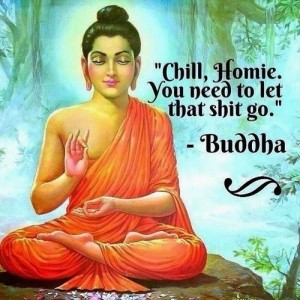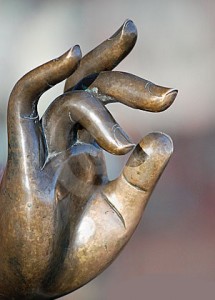Dear Sangha Friends,
This morning’s conversation reminded me of why I meditate in the first place, and why I’m devoting my last quarter of life to consciousness work. It’s because I’ve always felt deep inside (even as a child) that there was more to life than what was right in front of me. I’ve always wanted to know why things are the way they are. Meaning behind meaning behind meaning, that’s the ticket. So the inevitable question comes up at age 68 — “With all the challenges I’ve faced, what’s the meaning of my life? Why am I even here, in what we seemed to label a cultural wasteland?” 
This forces me back on my education and study of Hinduism and Buddhism, and BOOM! There’s the answer! Gotama was a radical critic of Hindu pantheistic religion. He advocated looking reality straight on the eye instead of mortifying his flesh and waiting to be blessed in a subsequent lifetime. Ram Dass repeated Gotama’s words in his famous 1960s statement — “You can never be anywhere except where you are…exactly where you need to be for your greatest conscious evolution.”
We talked this morning about other places, other times, other experiences, as if they were better than ours today. We romanticized. We subtly revealed some feelings of unhappiness because of what we think and feel to be “not OK” about here and now. We shot energy out of ourselves into empty mental space while we were actually sitting at 43 Saint Michael in a meditation group like one we would hope to find if we were in Portland or Paris. We were here, but we were thinking about there.
Gotama taught in a pastoral social environment much quieter and stable than our 24/7 cyber rodeo. His original students were eating non-toxic foods and breathing clean air. Their closeness to nature produced more dopamine and less cortisol. Their stress levels did spike at crisis, but not like ours. They dealt with what was right in front of them from moment to moment and were not tantalized by media constantly reminding them that the life they had was always inferior to someone else’s in some other time and place.
We’ve had thousands of years to get our psychological and spiritual acts together, yet cognitive psychology is literally falling apart as more humanistic and spiritual forms proliferate. People like us gravitate to meditative practice and depth psychology like Jung’s because we know intuitively that no lasting answers to happiness exist outside the mind’s perception of exactly what we think and feel right now.
 Modern culture produces too much neurosis. Materialism, sex and youth obsession tell us to keep trying to be something we are not. We grow frantic, exhausted and less and less able to do what the 12-Step folks wisely say — accept the things we cannot change, change the things we can. We CAN change how we think and feel by observing mindfully how we fantacize and how the fantasy hypnotizes us into craving more and more of its content. We end up addicted to our ignorant delusions and hating our reality because it doesn’t match up.
Modern culture produces too much neurosis. Materialism, sex and youth obsession tell us to keep trying to be something we are not. We grow frantic, exhausted and less and less able to do what the 12-Step folks wisely say — accept the things we cannot change, change the things we can. We CAN change how we think and feel by observing mindfully how we fantacize and how the fantasy hypnotizes us into craving more and more of its content. We end up addicted to our ignorant delusions and hating our reality because it doesn’t match up.
Centuries after Gotama the early alchemists like Richard Dorn (1450) tried to actually change physical reality by converting lead into gold. They finally realized their “philosopher’s stone” was actually their minds’ desire to see something better than what it really was. The science of mental alchemy grew out of the realization that there are things you can do physically and things you can’t. So, they concluded, you better get a grip on your mind’s habit my of constantly creating fantasies of the impossible. When we meditate properly, we train the mind to see how impermanent, yet persistent our mental dreams are. They are as shifty and changing as the alchemists’ lead was solid and heavy.
Even the great existentialist thinkers like Sartre, Heidigger and Camus knew the importance of seeing objective reality. Shit happens, so deal with it, was essentially their message. Today, existential humanistic therapy tells us, Be Here Now. If you hate your here and now, meditate on it. Catch yourself wandering around in depressing daydreams about what you don’t have. If you want more trees, move to Oregon, but be grateful and don’t ignore the fact that you have a vipassana sangha right here in the OC. The work we do here is very high spiritual stuff, and we’re lucky to have it.
I encourage you to intensify your meditative practice. We each have to strive to become the type of person (see below) we would hope to meet if we went to some other place we thought was better than where we really are. Sober Buddha loves you.
You are driven in life by the search for meaning and have a passion for culture and consciousness. You are a deeply spiritual person who thrives in an environment where people question their existence and devote themselves to a higher sense of being. You enjoy a stimulating environment and do best when you are challenged, mentally, and spiritually. You see life as an adventure and enjoy conversing with others on the big philosophical questions of life. Whether you are spending time in a bustling market, or meditating in a quiet garden, you are nourished by a society that is devoted to serving others.
Share this Post
